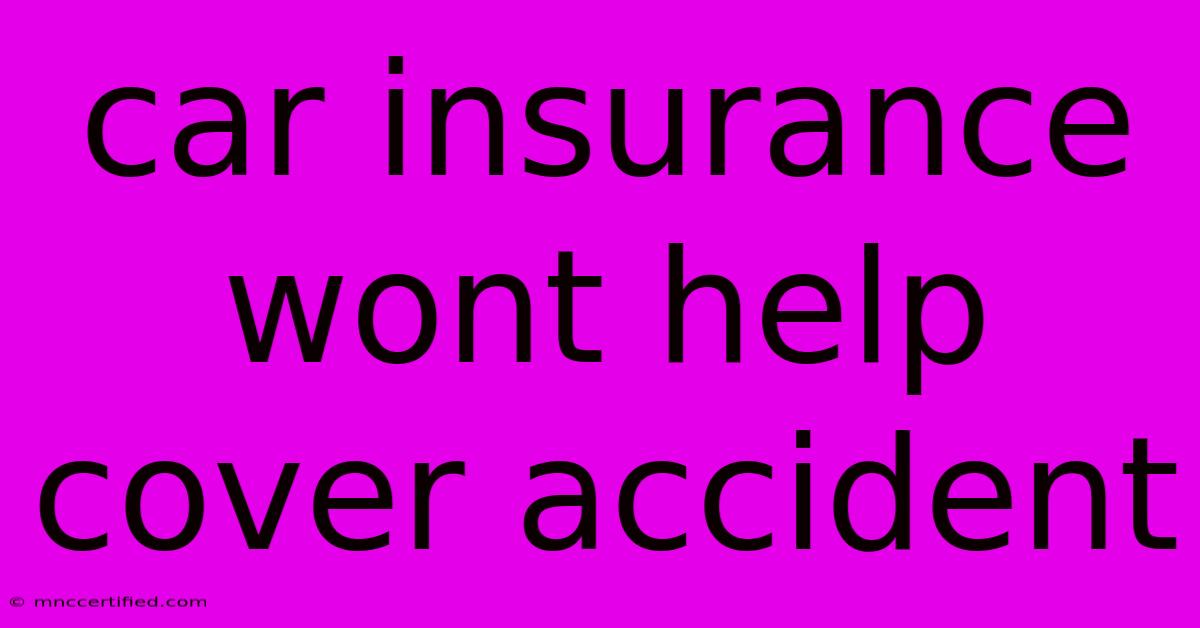Car Insurance Wont Help Cover Accident

Table of Contents
When Car Insurance Won't Cover Your Accident: Understanding the Fine Print
Car insurance is essential for every driver, but it's not a magic shield against all financial burdens after an accident. There are situations where your insurance might not cover the damages, leaving you with hefty repair bills or even legal trouble.
Understanding Exclusions is Key
Every insurance policy comes with a detailed list of exclusions – situations where coverage doesn't apply. These exclusions are often found in the fine print, making it easy to miss them. It's crucial to carefully review your policy and understand what your insurance covers and doesn't cover.
Common Scenarios Where Car Insurance Might Not Cover Your Accident:
1. Driving Under the Influence (DUI)
If you're involved in an accident while driving under the influence of alcohol or drugs, your insurance company may refuse to cover damages. This is because DUI is considered a criminal offense and insurance companies don't cover illegal activities.
2. Driving Without a License or Proper Insurance
Driving without a valid driver's license or proper insurance is a violation of the law. If you cause an accident in such a situation, your insurance won't cover the damages.
3. Using Your Car for Commercial Purposes
Car insurance policies usually cover personal use only. If you're using your vehicle for commercial purposes, such as delivering goods or transporting passengers for a fee, your insurance policy might not cover any accidents.
4. Racing or Reckless Driving
Engaging in racing or reckless driving activities, such as street racing or driving at excessive speeds, will likely void your insurance coverage. These behaviors are considered high-risk and outside the scope of regular insurance coverage.
5. Uninsured or Underinsured Motorist Coverage
If you are involved in an accident with an uninsured or underinsured driver, your own car insurance policy may cover your damages. However, you need to have purchased uninsured or underinsured motorist coverage as part of your policy.
Important Note:
Even if your insurance policy covers the accident, it doesn't automatically mean you'll receive full compensation for all damages. The insurance company might deny your claim or offer a lower settlement than you expect. This can happen due to several reasons, including:
- Pre-existing damage: If your vehicle already had pre-existing damage, the insurance company might not cover the entire repair cost.
- Exceeding coverage limits: Your policy has specific coverage limits, and if the damages exceed those limits, you'll be responsible for the remaining amount.
- Violation of policy terms: If you violate any terms of your insurance policy, such as failing to notify the company about a change in your driving habits, your coverage may be limited or denied.
Preventing Unpleasant Surprises:
- Review your policy thoroughly: Don't just skim through the document; read it carefully to understand your coverage and exclusions.
- Ask questions: If anything is unclear, don't hesitate to contact your insurance agent or company representative.
- Maintain a clean driving record: Avoid speeding tickets, reckless driving, and DUI offenses to keep your insurance rates lower and ensure full coverage.
- Consider additional coverage: Explore options like uninsured/underinsured motorist coverage and collision/comprehensive coverage for added protection.
By understanding the intricacies of car insurance, you can avoid unexpected financial burdens after an accident. Make sure you're fully informed and protected on the road.

Thank you for visiting our website wich cover about Car Insurance Wont Help Cover Accident. We hope the information provided has been useful to you. Feel free to contact us if you have any questions or need further assistance. See you next time and dont miss to bookmark.
Featured Posts
-
Illinois Gun Bans Ruled Unconstitutional
Nov 09, 2024
-
Pet Shop Boys Cover David Bowies All The Young Dudes
Nov 09, 2024
-
Tony Todd Known For Candyman Dead At 69
Nov 09, 2024
-
Ucla Run Game Fuels Victory Against Iowa
Nov 09, 2024
-
Scrambler Therapy Covered By Insurance
Nov 09, 2024